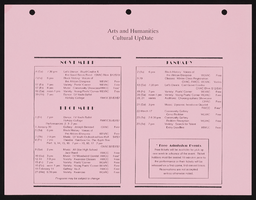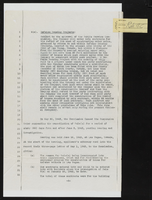Search the Special Collections and Archives Portal
Search Results
"Las Vegas Bugle" photographs of "skinny guy - Caspar?", undated
Level of Description
Archival Collection
Collection Name: Las Vegas Bugle Collection on Lesbian, Gay, Bisexual, and Transgender History
Box/Folder: Box 03
Archival Component
"Las Vegas Bugle" posed photographs, Kerr, Kenny, undated
Level of Description
Archival Collection
Collection Name: Las Vegas Bugle Collection on Lesbian, Gay, Bisexual, and Transgender History
Box/Folder: Box 03
Archival Component
"Las Vegas Bugle" posed photographs, "Mychael?", Cave Nightclub, undated
Level of Description
Archival Collection
Collection Name: Las Vegas Bugle Collection on Lesbian, Gay, Bisexual, and Transgender History
Box/Folder: Box 03
Archival Component
"Aid for AIDS of Nevada", 1997 September 02
Level of Description
Archival Collection
Collection Name: Las Vegas Bugle Collection on Lesbian, Gay, Bisexual, and Transgender History
Box/Folder: Box 01
Archival Component
Anne Davis Mulford disclaimer, 1994 May 16
Level of Description
Archival Collection
Collection Name: Las Vegas Bugle Collection on Lesbian, Gay, Bisexual, and Transgender History
Box/Folder: Box 01
Archival Component

Alpha Kappa Alpha Sorority, Theta Theta Omega Chapter arts and humanities committee reports
Date
Archival Collection
Description
From the Alpha Kappa Alpha Sorority, Incorporated, Theta Theta Omega Chapter Records (MS-01014) -- Chapter records file.
Text

Transcript from interview with Mike Unger by Barbara Tabach, January 21, 2016
Date
Archival Collection
Description
In this interview, Unger reflects upon his long and successful career in hotel management in Las Vegas and also in Arizona and Pennsylvania. He shares stories as a local celebrity, particularly in the 1970s and 1980s when he worked at Caesars Palace, as well as the big projects he oversaw, including organizing the first big fight nights, World Series of Tavern Poker and Grand Prix race. He talks about working with Morris Shenker, Moe Dalitz, Cliff Perlman and Billy Weinberger, and the role of the Jewish community in the city, and specifically in the gaming industry. Unger also discusses his non-gaming industry ventures which have included a satellite communications business and a bagel business.
Mike Unger was born in Queens, New York in 1947, and spent most of his childhood in Long Island, growing up in a predominantly Jewish and Italian community. As a young adult, Unger was already working hard, running one of his family?s restaurant after school. When he was in high school, his family moved to Los Angeles to accommodate his father?s health needs, and eventually end up in Las Vegas by 1967. Over the next two decades, Unger would work at nine properties in the city. Unger is one of the University of Nevada, Las Vegas? first hotel management graduates, and started his career with Summa Corporation in its management training program at the Frontier Hotel and Casino. After a brief stint at the Airport Marina Hotel in Los Angeles in 1972, Unger returned to Las Vegas, serving in management capacities at the Aladdin Hotel and Casino, Summa Corporation headquarters and Landmark Hotel and Casino. In 1978, he joined Caesars Palace Hotel and Casino management team, and was integral in creating the city?s first large boxing events, the World Series of Tavern Pool, and the Grand Prix race. Unger also ran properties for the White Mountain Apache and Colorado River Indian Tribes in Arizona, as well as the Showboat Hotel and Casino. In this interview, Unger reflects upon his long and successful career in hotel management in Las Vegas and also in Arizona and Pennsylvania. He shares stories as a local celebrity, particularly in the 1970s and 1980s when he worked at Caesars Palace, as well as the big projects he oversaw, including organizing the first big fight nights, World Series of Tavern Poker and Grand Prix race. He talks about working with Morris Shenker, Moe Dalitz, Cliff Perlman and Billy Weinberger, and the role of the Jewish community in the city, and specifically in the gaming industry. Unger also discusses his non-gaming industry ventures which have included a satellite communications business and a bagel business.
Text

Erika Castro interview, November 12, 2018: transcript
Date
Archival Collection
Description
Interviewed by Maribel Estrada Calderón. Barbara Tabach and Laurents Banuelos-Benitez also participate in the questioning. Erika Castro was born in Mexico City in 1989. At the age of three, she migrated with her family to the United States. She remembers entering Kindergarten without knowing how to speak English. She graduated from the College of Southern Nevada. Castro has since been a political activist. Subjects: PLAN, Planned Parenthood, Environmental Justice, UndocuNetwork, Deferred Action for Childhood Arrivals, DREAM Act
Text

Valorie Vega interview, November 19, 2018: transcript
Date
Archival Collection
Description
Interviewed by Laurents Bañuelos-Benitez. Barbara Tabach also participates in the questioning. Valorie J Vega was born in raised in Los Angeles County. Her father, Fred Vega, was one of the first firefighters hired in the Los Angeles County area. Vega was one of three children, and remembers spending her childhood surrounded by family. In college, Vega began studying biology only to realize that she was better suited studying Spanish. Upon completion of her undergrad, Vega went on to earn a Master's in Spanish interpretation. As a result of her studies, Vega was able to secure a job in the Court Interpreter program in Las Vegas, moving here in 1978. Her position in the interpreter program, led her to pursue a degree in law which in turn led to a successful career as a lawyer and a judge.
Text

